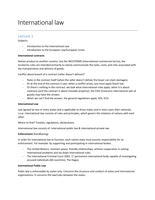International law
Lecture 1
Subjects:
- Introduction to the International Law
- Introduction to the European Law/European Union
International contracts
Deliver product to another country: Use the INCOTERMS (international commercial terms); the
Incoterms rules are intended primarily to clearly communicate the tasks, costs, and risks associated with
the transportation and delivery of goods.
Conflict about breach of a contract (seller doesn’t deliver)?
- Rules in the contract itself (when the seller doesn’t deliver the buyer can claim damages).
- Or at the end of the contract it says: when a conflict arises, you must apply Dutch law.
- Or there’s nothing in the contract: we look what international rules apply: when it is about
contracts (and the contract is about movable property), the CISG (Contracts international sale of
goods) may have the answer.
- When we can’t find the answer, the general regulations apply: EEX, ECO.
International Law
Law agreed by two or more states and is applicable to those states and in most cases their nationals.
I.o.w. international law consists of rules and principles, which govern the relations of nations with each
other.
Where to find? Treaties, regulations, declarations.
International law consists of: International public law & international private law.
Enforcement (handhaving)
In order for international law to function, each nation-state must assume responsibility for its
enforcement. For example: by supporting and participating in international bodies.
- The United Nations: maintain peace, friendly relationships, achieve cooperation in solving
international problems and lay down international rules.
- The International Criminal Court 2002: 1st permanent international body capable of investigating
accused individuals (60 countries), The Hague.
International Public Law
Public law is enforceable by states only. Concerns the structure and conduct of states and international
organizations. It concerns the law/rules between the states.
, For example: set-up of international institutions (such as UN), issues of Human Rights (violation).
International Private Law
Law which deals with legal problems arising from legal relationships between parties domiciled in
different countries to which different legal systems apply.
- For example:
o Car 1 driver 1 living in Germany
o Car driver 2 living in France
o Traffic accident in a car park in the Netherlands
o Damage: damage car of driver 1, crushed box of Cuban cigars, broken bottle of Scotch
whisky.
- Question: which court of law has jurisdiction in this case? Dutch, German, French, Cuban,
Scottish.
- Answer depends on the places where the two parties involved live and where the accident
occurred.
- In this case: it’s a tort > a civil wrong between two parties
- The court of the country where the accident occurred has jurisdiction. Netherlands.
- Why? This is determined in the international law, so states agreed on this.
Bear in mind: if the legal conflict only involves two parties living in the same country, there can be no
choice over which legal system to use.
International Business Law
International private law concerning the activities and organization of multi-national businesses. (For
example, commercial transitions, contracts, insurance, investments).
Example 1 (book).
A seller, established in the UK, delivers 1.500 pair of shoes to a buyer who is established in Italy.
However, the buyer, despite several reminders, does not pay the price they agreed on.
The English seller starts litigation (start a lawsuit) against the Italian buyer, in an attempt to cancel the
sales contract and to get back the shoes he delivered.
This is a case of international private law.
Example 1 questions




